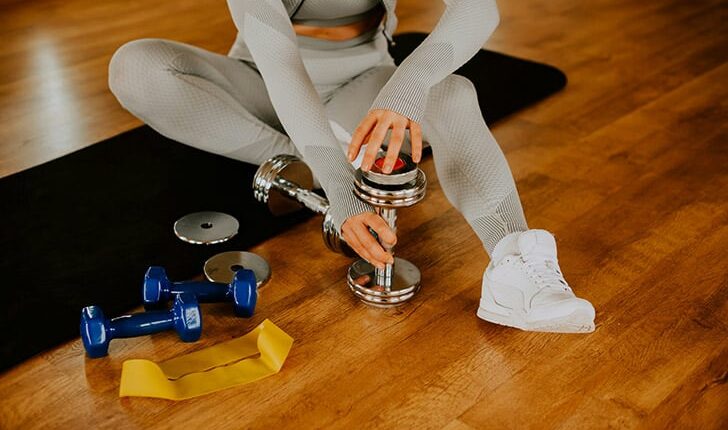7 Ways to Improve Your Health By Simplifying Your Life
You may want to improve your health especially when you aren’t feeling your best. From chronic pain and autoimmune disease to migraines and other conditions we deal with, it’s always a good time to improve your health.
Note: This article on health and simple living is by contributing writer, Tammy Strobel.
There are so many ways to improve your health and no one way is right for everyone. Focus on your best health. When I injured my back in January 2016, I was surprised because I’d been feeling strong and healthy. Also, I was scared because the pain was intense. I had a hard time walking around the house, sleeping, and it was difficult to concentrate on work.
Since my flare-up lasted longer than normal, I made an appointment with my doctor. After a few exams and x-rays, she diagnosed me with arthritis in my lower back. After the diagnosis, I felt grateful because I finally had some answers! Also, seeing my doctor empowered me to take tiny steps that improved my health.
In this article, I’ll share small steps that helped me recover and rebuild strength. This article is based on my personal story and is not medical advice. If you are experiencing health challenges, please see a medical professional.
1.) Listen to health care providers
After spending a lot of time searching online for back healing modalities, I broke up with the internet. Instead, I listened to my doctor. My doctor referred me to a local physical therapist, so I followed up and made my first appointment (one of many).
My physical therapist was helpful and knowledgeable. He prescribed specific back exercises and I did them consistently. I began by doing exercises 5-minutes a day. Over a period of six months, I increased the intensity of my workouts little by little.
2.) Exercise regularly
Exercising everyday isn’t easy, and sometimes it’s a slog. However, I keep up my exercise habit because I want to avoid back pain, and build strength as I age. Plus cycling and lifting weights helps me maintain my physical and mental health. Interestingly, studies show that exercise can lower your risk of dementia, high blood pressure, stroke, depression, and more. But exercise isn’t a guarantee that I’ll avoid cancer, dementia, or debilitating back pain. Exercising regularly is essential to living my best life, and it won’t stop the aging process.
3.) Prioritize sleep
The American Academy of Sleep Medicine argues that getting enough sleep is essential for good health and healing. In a recent position statement the Academy said, “While sleep is essential for healing, the hospital environment can be detrimental to patients’ sleep duration and sleep quality. Interventions to reduce noise, optimize lighting, and consolidate interruptions necessary for patient monitoring can be beneficial to patients’ sleep, mood, and well-being.” For me, this is true in a hospital setting and at home. Whether I’m recovering from a back injury or surgery, getting good quality sleep always makes me feel better.
4.) Ask for help
Stanford social psychologist Xuan Zhao says that “asking for help is hard, but people want to help more than we realize.” If I’m unwell, I’m not afraid to ask loved ones for help. For example, I’ll ask for help with errands, cooking, and household chores. In addition, asking for help has strengthened my relationships. And that’s a good thing! Studies have shown that strong relationships are the number one indicator of long lifespan.
5.) Create a cozy space
A few months before my arthritis diagnosis, we moved out of our tiny house and into a small apartment. Our apartment had a bathtub, a washer and dryer, and I didn’t have to climb a ladder to get into my bed. Most of the time our tiny house was a cozy place to live; just not when I was sick or injured. Other ways I created a cozy healing environment included drinking coffee, reading novels, snuggling with my cats, and making time for naps.
6.) Reduce stress
“Reducing your stress levels can not only make you feel better right now, but may also protect your health long-term. Several research studies have demonstrated, for example, that interventions to improve psychological health can have a beneficial impact on cardiovascular health. As a result, researchers recommend boosting your positive affect—feelings like happiness, joy, contentment, and enthusiasm—by making time for enjoyable activities every day,” says the American Psychological Association.
My diagnosis helped me let go of busyness, lower my stress levels and aided my recovery. I started by saying “no” to work requests more often. This left me with time to rest, do physical therapy, and focus on routines that nourished my well-being like my gratitude practice.
7.) Work less
Without simplifying our lives, I wouldn’t have been able to work less when I was ill. Ample savings, and my husband’s support, allowed me to work part time. During this convalescence, I brainstormed ways to make my work schedule sustainable because I didn’t want to work long hours.
Parting words …
I’m grateful that I simplified my life because it’s given me the time and resources to take care of my body and mind. For example, instead of shopping for new clothes at the mall, I can allocate some of those funds toward healthcare. I also understand that my health status could change in an instant, so I don’t take my good health for granted.
Resources
Looking for more resources? Explore the list below:
Books
- Why We Sleep by Dr. Matthew Walker
- The Telomere Effect by Dr. Elizabeth Blackburn & Dr. Elissa Epel
- The Good Life: Lessons from the World’s Longest Scientific Study of Happiness by Robert Waldinger, M.D & Marc Schulz, Ph.D
Podcasts & Talks
- How to Put Yourself to Bed
- Sleep is Your Superpower

